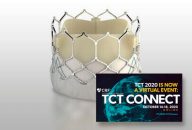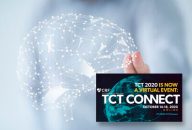Sleep duration (either short or long) affect the risk of stroke according to this recent analysis. We had visited a study published in JACC on the link between acute MI and sleep duration. This study appears to show similar results as regards sleep duration and stroke. The work prospectively included 79,881 men and women between…
TCT 2020 | Surprising Differences in Stroke between SAPIEN 3 and Evolut R
One-year outcomes of the head to head trial between CoreValve Evolut R vs Sapien 3 showed a significantly higher difference in stroke vs. patients receiving the self-expanding valve (Sapien 3 6.9% vs Evolut R 1%; p=0.002). The SOLVE-TAVI randomized 2×2 patients with severe aortic stenosis and high surgical risk to Sapien 3 or Evolut R and…
TCT 2020 | Efficacy of Cerebral Protection Device TriGUARD 3 During TAVR
Cerebral protection device TriGUARD 3, designed to cover all supra-aortic vessels during transcatheter aortic valve replacement (TAVR), is safe to use, according to the outcomes of the REFLECT II study. The technical feasibility of the device, which requires transfemoral access, does not seem to have an impact over clinical events. The primary safety endpoint was a VARC-2-defined…
ESC 2020 | 2020 Atrial Fibrillation Guidelines: News on Diagnosis, Classification, and Care
New guidelines for the diagnosis and treatment of atrial fibrillation (AF) were released at the 2020 European Society of Cardiology (ESC) virtual congress. This document incorporates several findings from the latest clinical trials, but also represents a great shift in terms of how physicians from different specialties should classify and manage arrhythmia after confirming the…
ESC 2020 | Atrial Fibrillation and Rhythm Control: A Matter of Time?
Early rhythm control therapy in patients recently diagnosed with atrial fibrillation reduces the risk of cardiovascular events compared against the usual treatment of frequency control. These data come from the EAST-AFNET 4 trial recently presented at ESC 2020, simultaneously published in NEJM. These data suggest that we should offer patients early rhythm control therapy to…
Natural History of Severe and Asymptomatic Carotid Lesions
Deciding whether to intervene a severe (70-80%) carotid lesion in an asymptomatic patient is challenging. We know the margin of error is small and an excess of events caused by the intervention could tilt the scales. However, the updated information on the natural evolution of these lesions is scarce. This retrospective analysis included asymptomatic patients…
Infarction, Stroke and Aortic Emergency Syndromes in the Shadow of the Pandemic
The coronavirus pandemic has had a negative impact on the most pressing cardio and neurological emergencies, such as strokes or aortic dissection. These emergencies are normally treated in high complexity centers, which is why it is relatively simple to analyze the number of transfers before and after the pandemic. For some time, care centers have…
Blood Pressure Variability and Subclinical Brain Disease
Elevated blood pressure variability was associated with a wide range of subclinical structural changes in the brain. These structural changes could be the mechanisms explaining a higher incidence of dementia and stroke. This study included 2348 participants age ≥55 years in a prospective cohort. Blood pressure was measured in each visit since 1990, and since 2005 all…
SPARCL: Highly Effective Prevention of New Events with Atorvastatin after a Stroke
In patients with recent stroke or transient ischemic attack, the total number of vascular events prevented by atorvastatin was twice as high as the number of prevented index events. In other words, the power of atorvastatin in secondary prevention is far superior to primary prevention. This gigantic reduction, both in index and recurrent events, gives…
Asymptomatic Carotid Artery Stenosis: Do We Have All the Answers?
Advancements in therapies to reduce the impact of stroke in asymptomatic carotid artery stenosis have been hard to come by over the last decade. Several points of disagreement among published randomized trials prevented their information from being integrated into daily clinical practice. However, over the past 5 years, there has been some alignment, allowing for this…









